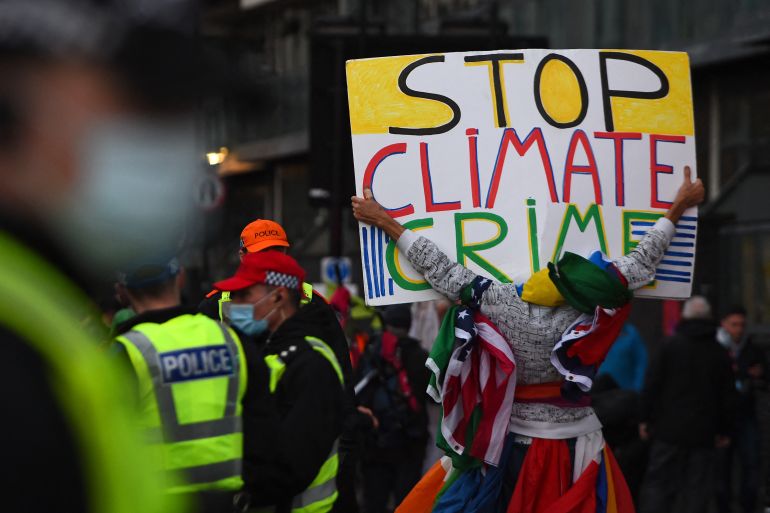New COP26 draft deal urges coal curbs, faster climate action
UN climate summit draft texts urge accelerated phase-out of unfiltered coal and ‘inefficient’ fossil fuel subsidies, as negotiators work overtime to secure a deal.

Negotiators at this year’s United Nations climate talks are poring over fresh proposals aimed at sealing a deal that could credibly be said to boost the world’s efforts to tackle global warming.
British officials chairing the COP26 talks in Glasgow, Scotland, released new draft agreements on Saturday after telling delegates from almost 200 nations late on Friday to go and get some rest as the official deadline passed.
Keep reading
list of 4 itemsShould nations go nuclear to save the planet?
COP26 misses deadline for climate deal but talks continue
Vietnam reconsiders methane-emitting rice amid climate crisis
A proposal for the overarching decision retains contentious language calling on countries to accelerate “efforts towards the phase-out of unabated coal power and inefficient fossil fuel subsidies”.
In a new addition, the text says nations will recognise “the need for support towards a just transition” – a reference to calls from those working in the fossil fuel industry for financial support as they wind down jobs and businesses.
But it failed to allocate dedicated cash specifically for loss and damage – the mounting cost of global warming so far – instead reiterating “the urgency of scaling up action and support” for vulnerable and poorer nations.
It noted “with deep regret” that wealthy nations had also failed to stump up a separate annual sum of $100bn they promised over a decade ago, but said only that it would come by 2023.
UK Prime Minister Boris Johnson said on Friday that he believed “an ambitious outcome is in sight” at the two-week talks, which are now in overtime.
In another proposal, countries are “encouraged” to submit new targets for emissions reduction for 2035 by 2025, and for 2040 by 2030, establishing a five-year cycle. Previously, developing countries were expected to do so only every 10 years.
Scientists say the world is not on track to achieve the 2015 Paris accord’s ambitious goal of capping global warming at 1.5 degrees Celsius (2.7 Fahrenheit) by the end of the century compared with pre-industrial times.
Al Jazeera’s Andrew Simmons, reporting from Glasgow, said the texts published on Saturday looked “reasonably positive” but said that all delegates will have to agree on them to seal a formal deal.
“The way things are planned is to follow through on this with [an informal] plenary meeting getting people together, ‘stocktaking’ as it’s termed in this summit, and looking at the way ahead and what can happen next,” he said.
“Later on Saturday, the plan is to have a full formal plenary and we will see actual agreements made, and the idea is to wrap up the summit sometime on Saturday afternoon.”
“The assessment will be, yes there has been some progress but [it remains to be seen] whether or not this will be seen as an outright success,” he added.
Tracy Carty, the head of Oxfam’s COP26 delegation, said in a statement that the draft deal was “still not good enough”.
“We need the strongest possible outcome to ensure governments come back next year with strengthened emission reduction targets that will keep 1.5 degrees alive. And decisive progress on finance to help countries adapt and for the loss and damage endured,” Carty said.
“It is of deep concern that developing countries’ proposal for a loss and damage finance facility has not been included in this new draft.”
Juan Pablo Osornio, the head of Greenpeace’s COP26 delegation, also said he was concerned that the draft deal was insufficient to tackle the scale of the climate crisis.
“The language that was in the previous text about coal phase-out and fossil fuel subsidy phase-out was a lot stronger than what we’re seeing now,” he told Al Jazeera.
He said that as the latest draft text still includes scope for “inefficient” fossil fuels subsidies, “that leaves a little bit of wriggle room to not really do as much as you really could”.
Osornio said the details of the revised draft deal would need more scrutiny and that the trust of many developing countries had been lost after richer nations failed to deliver on a pledge to provide $100bn per year of funding for developing countries to adapt to climate change.
“It’s going to be the exciting plenary in the history of COPs” he said. “It’s a high-risk game that the [COP26] presidency is playing, releasing this large amount of texts [to a vote].”